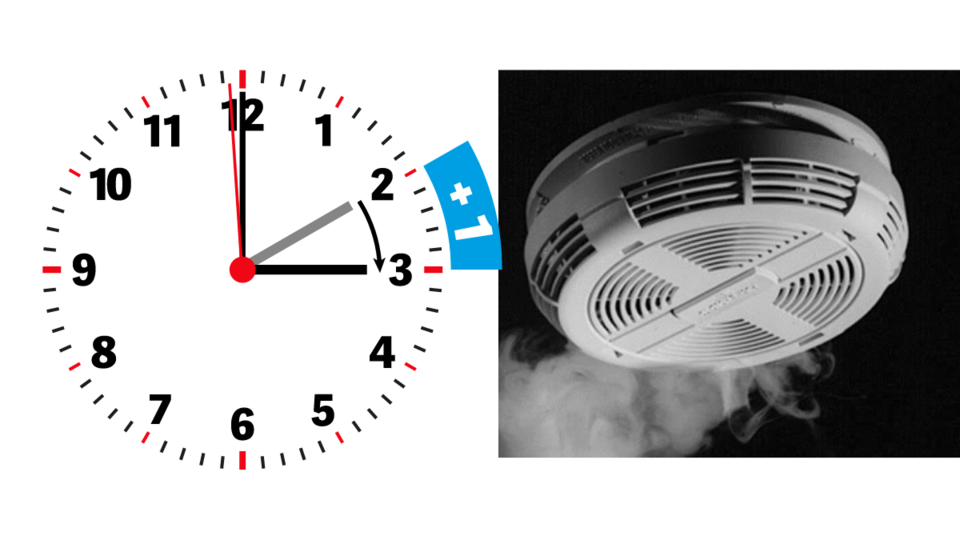Before you go to bed tonight, don't forget to adjust your clocks ahead one hour in observance of Daylight Savings time. Tonight is a great time to change the batteries and make sure you have working smoke and carbon dioxide detectors in your home.
As we spring ahead, spring up to your smoke detectors and don't fall behind on changing the batteries!
As we review reports from fire and life safety inspections conducted by professional fire protection engineers, there is one consistent theme: smoke alarms without batteries! Guest cabins, apartment buildings, dormitories, and single family homes all have the same issue, which means our visitors, employees, and partners may be sleeping in buildings that are not equipped to notify them of a fire.
Luckily, this problem can be fixed immediately: Put a battery in your smoke alarm!
Ok, we understand that there are reasons the batteries were removed. Maybe the alarm is too close to cooking smoke or shower steam, or maybe it's dirty. All of these problems can be a nuisance by causing frequent false alarms. However, the solution is not removing the battery, but cleaning or relocating your smoke alarm.
The National Fire Protection Association tells us we should change our smoke alarm batteries twice a year, so why not just time it with the changing of your clocks for Daylight Savings time? To prepare for time-change weekend, make sure you have enough batteries available for all of your smoke detectors, and remember, when you change your clock, change your batteries.
FIRE INFO FOR YOU
Employees
Did you know, according to the National Fire Protection Agency, that having a working smoke detector in your house will cut the risk of dying in a fire by 50 percent? Read more on NPFA.
Park Leadership
The Branch of Structural Fire has been sending professional fire protection engineers into the parks for many years. We have found:
- almost 46% of buildings where people sleep do not have full fire alarm systems as required.
- almost 17% of buildings where people sleep do not have smoke alarms as required.
National/Regional Leadership
We simply have too many buildings where people sleep that do not have adequate smoke protection. There are a lot of reasons why:
- occupants remove smoke alarms or batteries
- old buildings are no longer in compliance with modern codes
- inadequate numbers of people to conduct compliance inspections
- new and altered building plans that are not reviewed by competent fire officials.
We challenge all leaders to think about how to resolve this issue. What are your ideas? We would love to hear them.
TAKE ACTION
- Tonight, when you go home, take an inventory of how many smoke alarms are in your house. Make sure you have a fresh battery ready for every smoke alarm. Then change the battery this weekend when you change your clock.
- Housing managers: Remind your residents to change their smoke alarm batteries. Consider implementing a battery exchange program to coincide with daylight saving time changes. This will ensure your residents have fresh batteries and allow you to control the battery waste stream.
- Commercial service managers: Talk to your concessions contractors about their responsibilities to ensure that their fire and life safety systems are in working order in all of their buildings.
NPS FIRE FACTS
In 2008, an NPS unit experienced a fire in a concessions employee dormitory. Upon arrival at the scene the fire department cut off the power to the building to protect the firefighters entering the building. The alarm system did not have a working battery backup, so room smoke detectors were disabled. One employee did not awaken and exit the building. Thankfully the quick work of our NPS structural firefighters saved this person's life in what could have been a tragic and avoidable accident.




